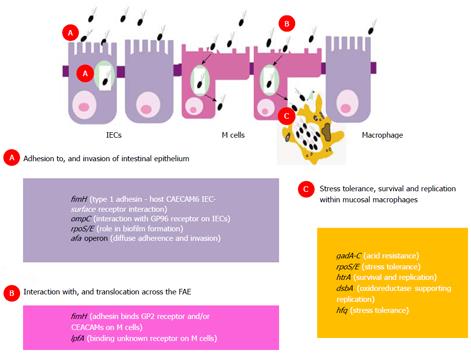Copyright
©2014 Baishideng Publishing Group Inc.
World J Gastroenterol. Jul 21, 2014; 20(27): 8751-8763
Published online Jul 21, 2014. doi: 10.3748/wjg.v20.i27.8751
Published online Jul 21, 2014. doi: 10.3748/wjg.v20.i27.8751
Figure 3 Crohn’s mucosally associated adherent, invasive Escherichia coli host mucosa interactions: genotype-phenotype relationships.
A: Adhesion to, and invasion of intestinal epithelium; B: Mucosal entry across the follicle-associated epithelium; C: Tolerance to stress, habituation and replication within mucosal macrophages. afa: Operon encoding afimbrial adhesin; CEACAM: Carcinoembryonic antigen-related cell adhesion molecule; dsbA: Gene encoding bacterial disulfide oxidoreductase; fimH: Gene encoding bacterial type-1 fimbrial adhesin; gadA-C: Glutamate-dependent acid resistance genes; GP2: Glycoprotein 2 receptor; GP96: Endoplasmic reticulum stress response glycoprotein 96; hfq: Gene encoding RNA-binding host factor essential for replication of the bacteriophage Qβ; htrA: Gene encoding high temperature stress protein A; IECs: Intestinal epithelial cells; lpfA: Gene encoding long polar fimbriae adhesin; M cells: Microfold cells; ompC: Gene encoding outer-membrane vesicle protein C; rpoS/E: Genes encoding stress tolerance sigma factors.
-
Citation: Tawfik A, Flanagan PK, Campbell BJ.
Escherichia coli -host macrophage interactions in the pathogenesis of inflammatory bowel disease. World J Gastroenterol 2014; 20(27): 8751-8763 - URL: https://www.wjgnet.com/1007-9327/full/v20/i27/8751.htm
- DOI: https://dx.doi.org/10.3748/wjg.v20.i27.8751









